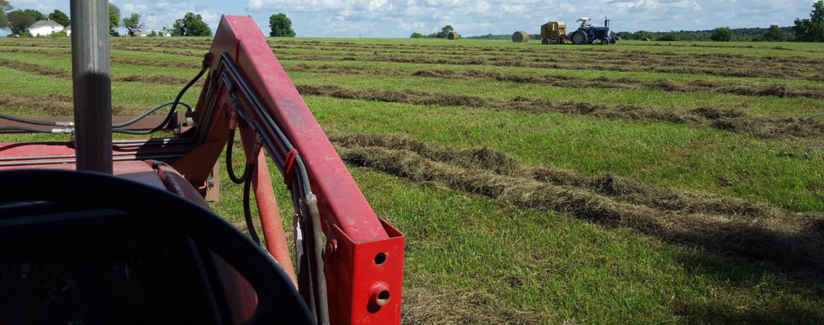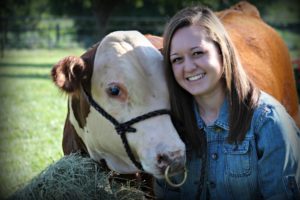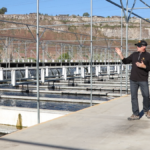
Life on the Farm: Interns Share Their Stories
What’s it like to live on a farm? How do ranchers take care of their animals? Who runs family farms?
This summer, two interns have been working with Best Food Facts – and they both grew up living (and working!) on family farms. Julie Choate will graduate in December with master’s of agriculture with an emphasis in communications from Missouri State University. Katelin Spradley is a senior at Oklahoma State University pursuing a bachelor’s degree in agricultural communications and animal science. We took the time to chat with them to find answers to questions we receive about farming, ranching and agriculture.
Tell us about your family’s farm.
Julie: “As a sixth-generation farmer, agriculture has always been a way of life for my family. My parents and I own and operate a beef cattle and poultry operation in Missouri. We run nearly 100 head of cattle. I have been showing registered Hereford cattle at local, state and national shows since I was 8 years old. We also have around 6,000 laying turkey hens in our barns at a time. We contract through a company and sell the eggs for hatching.”
Katelin: “My family, consisting of my mom, dad, brother and I, own a commercial cow-calf operation in the northwest part of New Mexico. We have around 200 head of Angus cross cattle and sell our calves through a video auction every fall. Our ranch consists of some private and state lands, but the majority is federal land leased from the Bureau of Land Management. We also raise a few sheep, chickens and a couple horses that we use to do almost everything from checking on cattle to helping us move them from pasture to pasture.”
You both have quite a legacy in agriculture. When you were a kid, did you have to help with chores?
Julie: “Oh, of course! However, they didn’t seem much like chores – I enjoyed (and continue to enjoy) every minute of it. My daily chores usually include feeding and checking cattle as well as washing and grooming show heifers. I also help rake or bale hay, work cattle and gather turkey eggs as needed. I will continue living and working on the farm for years to come. Next June, I’m getting married to a farmer from west-central Missouri. Together, we will own and operate a farm together.”
Did you like working on the ranch?
Katelin: “Yes, I liked living on my family’s ranch! I learned a lot about the value of hard work and gained an appreciation for life and nature. There were times when the hard work was miserable but in the end it gave me the drive and ambition that I rely on so much today. I didn’t truly appreciate all that our ranch gave me when I lived there but moving away has made me appreciate it more.”
Who operates your farm? Does a corporation run it?
Julie: “My family – that’s it. My parents are owner-operators and work on the farm all the time. It’s truly a way of life.”
Katelin: “I am the fifth generation to live and work on my family’s cattle ranch. My mom’s family came in a covered wagon to northwest New Mexico from Texas to homestead land and our family still remains there today. There is a legacy behind my family’s ranch and that is something that makes me extremely proud even though most ranches and farms in our area have a similar story.”
Both of your families raise animals and many different types – cows, sheep, turkeys, horses. How are the animals cared for?
Julie: “Our animals are one of our highest priorities. Their well-being is my family’s livelihood. We ensure that our animals are well taken care of each day. Aside from feeding, watering and providing them with a comfortable environment to live in, we also watch for signs of sickness. We have been trained by our farming ancestors and veterinarians to understand and identify when their livestock animals are not feeling well. Just like humans, animals occasionally get sick and require medicine to recuperate. We take all precautions to ensure that our animals stay as healthy and happy as possible.”
Katelin: “The health and wellbeing of our animals always came first on the ranch. I have never met a more compassionate set of people than my parents and the fellow ranchers we work with. I can recall multiple times when my family sacrificed time and comfort to ensure our cattle were healthy. We are always looking for new methods and technologies to make caring for our cattle easier.”
It sounds like you spend a lot of time outside in nature. What does your family do to protect natural resources of land, air and water?
Katelin: “My great grandfather is one of the most keen and caring environmentalists I have ever met and he ranched for nearly 60 years before moving to town to “retire.” Using lessons passed down from five generations who spent almost every waking moment interacting with nature we have been able to not only maintain but improve the quality of the land, air and water around us. Using a combination of old practices and new technologies we have provided a healthy habitat for both our cattle and the wildlife around us. Because we care so much for the environment we rely on for our livelihood, we use rotational grazing practices, erosion control, invasive species control, hunting, and minimal infrastructure to minimize our impact on nature and provide optimal benefits.”
What is one thing you wish more people understood about farming and ranching?
Julie: “I can say with confidence that most farmers truly care about the work they do and the well-being of their animals. As farmers, our ultimate task is to provide food for the world to consume – it’s a challenge. The population is growing. The amount of farmland is decreasing. Consumer confidence in the food system is decreasing. Each of these factors directly affect our ability to do our job. I hope that everyone can understand the goal of a farmer and the importance of agriculture. If you don’t understand, reach out to someone who does. Every farmer or agriculturalist I know would be happy to help an unsure consumer understand the food system.”
Katelin: “The entire food system, including the poultry, hog, beef, dairy, lamb and goat industries from production to processing and packaging, cares for and about their animals and about providing safe, healthy and affordable food. We have families that we feed with the exact same food we produce for the grocery store. We aren’t perfect, but we are always looking for new ways to improve and meet the demands of our consumers. We understand that the information out there about the food system is confusing, even for us. Agriculture doesn’t look like the red barn and green field ideal that it used to be but that’s okay because the compassion for life, strong work ethic, and pride in what we produce remains.”
What is the best thing about working in agriculture?
Julie: “To me, I enjoy living in a rural area where I can fall asleep at night hearing the crickets chirping and wake up listening to the birds sing. Farm work is hard and challenging, but also very enjoyable and rewarding. Our farm is primarily operated by my parents and I, but we lean on other family members and neighbors on occasion for extra help. The farming community is great to be a part of and truly a family in itself.”
Katelin: “I think the best thing about living and working on a farm is that you get to see a part of life that only two percent of the population really gets to experience. You become intimately tied to the land you work and the animals you care for. It is almost a spiritual experience. Plus, it allows you to approach life with a unique viewpoint. I understand and appreciate our food system and all the hard work, care, and consideration that goes into providing safe, wholesome and affordable food. Nothing in agriculture is guaranteed and I think growing up relying on what nature gives you puts a lot of other things that aren’t important into perspective. Everyone eats and everyone has a connection to agriculture and it’s nice to have that common connection with every person in the world!”
Thank you for letting us see what life is like on your ranch and farm. You perspective has helped us to better understand how our food is grown.



























